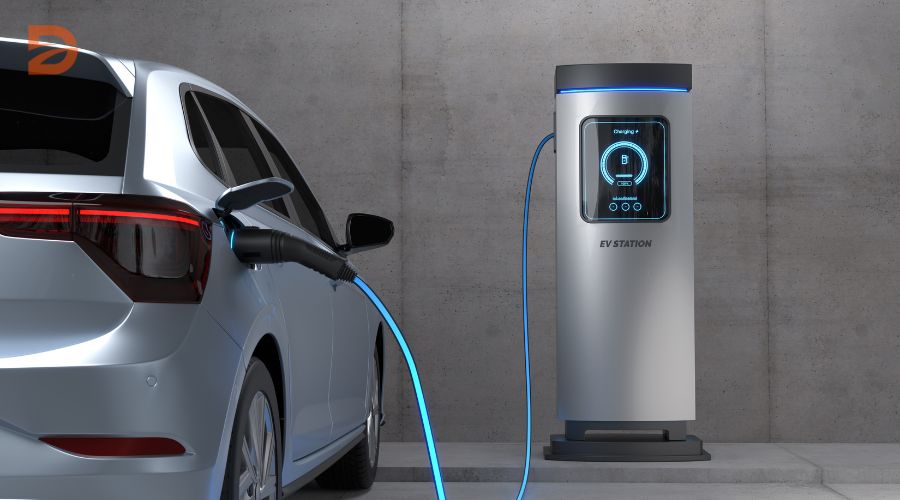Did you know that electric vehicles (EVs) now have an average price tag of $55,353 for new models in January 2024, compared to just $47,401 for new gas-powered cars? This surprising statistic highlights the rapidly evolving landscape of the automotive industry, where the battle between electric and traditional vehicles is heating up.
As more and more Americans consider making the switch to an EV, it’s crucial to understand the pros and cons of these two vastly different types of vehicles. This comprehensive article will dive deep into the key factors you need to consider, from sticker prices and fuel costs to maintenance expenses and environmental impact.
By the end, you’ll have a clear understanding of the tradeoffs between EVs and gas-powered cars, empowering you to make an informed decision that best suits your needs and budget. Let’s explore the EV vs. gas car showdown together.
Key Takeaways
- The average price of new electric vehicles is $55,353, compared to $47,401 for gas-powered cars.
- Charging an EV could save a motorist up to $14,500 over 15 years compared to a gas vehicle.
- Electric cars convert over 77% of electrical energy into operating power, while gas vehicles convert only 12-30%.
- The average EV sold in the U.S. produces emissions equivalent to a 91 mpg gas car, emitting less than the average gas car.
- Half of Americans now consider purchasing an electric or hybrid vehicle, according to Kelley Blue Book.
Sticker Prices: Electric Cars vs Gas Cars
When it comes to upfront costs, electric vehicles (EVs) generally have higher sticker prices than their gas-powered counterparts. According to recent data, the average purchase price for EVs was $56,371 compared to $48,064 for gas-powered cars. However, this price gap has been narrowing in recent years, with the average price paid for a new EV just $2,800 more than the average for a new gas car as of September 2023.
Upfront Costs and Tax Incentives
To offset the higher upfront cost of EVs, consumers can take advantage of federal and state tax credits. The federal EV tax credit offers up to $7,500 for new EVs and $4,000 for used EVs, provided the automaker’s vehicles meet certain manufacturing requirements. Many states also offer their own incentives, which can further reduce the cost of going electric.
Charging Infrastructure and Home Installation Costs
In addition to the vehicle purchase price, buyers should factor in the cost of installing a home EV charger, which typically runs around $2,000. However, some states and utility companies offer incentives to help offset this expense. Charging an EV at home using a standard 120-volt outlet can provide about 32 miles of range overnight, while a 240-volt Level 2 charger can add over 250 miles of range. Public charging stations tend to be more expensive than home charging but can be a convenient option for longer trips or when home charging isn’t possible.
| Cost Factor | Electric Vehicles | Gas-Powered Vehicles |
|---|---|---|
| Average Purchase Price | $56,371 | $48,064 |
| Federal Tax Credit | Up to $7,500 for new EVs, $4,000 for used EVs | None |
| Home Charger Installation | Typically around $2,000 | Not Applicable |
Fuel Costs: Electricity vs Gasoline
One of the major advantages of owning an electric vehicle (EV) is the potential to save significantly on fuel costs compared to a gas-powered car. Studies have shown that the average annual cost to fuel an electric car is around $485, while for a gas-powered vehicle, it’s approximately $1,117. This substantial difference is largely due to the superior efficiency of electric motors, which are 2.6 to 4.8 times more efficient than internal combustion engines. However, the exact fuel cost savings will depend on factors like the EV’s efficiency, the electricity rates in the owner’s region, and their charging habits.
EV Efficiency and Electricity Rates
Electric vehicles are incredibly efficient, with models like the Tesla Model 3 and Chevy Bolt achieving over 100 miles per gallon of gas equivalent. This translates to an average cost of just 11.4 cents per mile when charged during off-peak hours, compared to around 21 cents per mile for a typical gas-powered car. However the cost of electricity can vary significantly by location, so it’s crucial for prospective EV buyers to research the typical rates in their area.
Public Charging Costs vs. Home Charging
While charging an EV at home is generally much cheaper than fueling a gas car, the cost of public charging stations can be more expensive. Owners who rely primarily on public charging may see their fuel savings diminish compared to those who can charge mainly at home. However, many electric utilities offer lower rates for charging during off-peak hours, which EV owners can take advantage of by programming their vehicles to charge at night.
Overall, the potential fuel savings of an EV are significant, but the exact amount will depend on individual driving and charging habits, as well as regional electricity rates.
Maintenance Costs: Electric Cars vs Gas Cars
When it comes to maintenance costs, electric vehicles (EVs) shine. On average, EV owners spend significantly less on maintenance and repair over the lifespan of their cars compared to those with gas-powered vehicles. According to recent data, the average maintenance service costs for electric cars over the first 3 years is just $77, while for gas-powered cars it’s $228 – a notable difference.
The savings continue to grow after the initial 3 years. Electric car maintenance costs average $514, while gas-powered cars see an average of $749. In fact, repair bills for electric cars were on average 22% less than for gas-powered cars. The Department of Energy estimates electric vehicle maintenance costs to be around 6.1 cents per mile, compared to 10.1 cents per mile for gas-powered cars.
The primary reason for these cost savings is the simpler design of electric vehicles. With fewer moving parts, EVs eliminate the need for many maintenance tasks required by gas cars, such as oil changes, tune-ups, and exhaust system repairs. Electric cars also feature regenerative braking, which helps extend the life of brake components.
“Owning a new, compact electric vehicle is only slightly more expensive annually, approximately $600 more than a gas-powered car. However, the electricity costs to drive 15,000 miles are $546, while the gas cost for the same distance is $1,255 higher. This, combined with the lower maintenance costs, makes EVs a more cost-effective option in the long run.”
With the growing popularity of electric vehicles, it’s clear that maintenance costs are a significant advantage over their gas-powered counterparts. As EV technology continues to evolve, the maintenance savings are likely to become even more pronounced, making them an increasingly attractive choice for drivers.
Total Cost of Ownership: Electric Cars vs Gas Cars
When evaluating the overall cost-effectiveness of electric vehicles (EVs) versus gas-powered cars, it’s crucial to consider the total cost of ownership (TCO) over the vehicle’s lifetime, not just the upfront purchase price. Studies have shown that owning an EV is generally cheaper in the long run, with net savings ranging from $7,000 to $11,000 compared to a similarly sized gas-powered car.
Calculating Lifetime Costs
To calculate the lifetime costs, buyers should factor in the following:
- Upfront costs (minus any applicable incentives)
- Fuel expenses (electricity vs. gasoline)
- Maintenance and repair costs
- Other operating expenses
The U.S. Department of Energy provides a helpful calculator to estimate the TCO for specific EV and gas car models based on the owner’s driving habits and local costs.
Plug-in Hybrid Vehicles: A Compromise?
For buyers who want to experience some of the benefits of electric driving but are not ready to fully commit to a battery-electric vehicle, plug-in hybrid electric vehicles (PHEVs) may offer a viable compromise. These vehicles combine a gasoline engine with an electric motor and battery pack, allowing them to operate in both all-electric and hybrid modes. A PHEV with an all-electric range of 50 miles or more can enable the owner to drive primarily on electricity for their daily commute while having the gasoline engine as a backup for longer trips. This can help mitigate range anxiety while still providing fuel cost savings and emissions reductions compared to a traditional gas-powered car.
EV vs Gas Cars: Environmental Impact
One of the primary advantages of electric vehicles (EVs) is their significantly lower environmental impact compared to gas-powered cars. EVs produce zero direct emissions, eliminating the harmful pollutants like carbon monoxide and nitrogen oxides that contribute to climate change and poor air quality. Even when accounting for the emissions generated during the electricity production used to charge an EV, studies show that electric vehicles have a much smaller carbon footprint over their lifetime.
Beyond the direct environmental benefits, the widespread adoption of electric vehicles can also have a positive impact on public health by improving local air quality and reducing noise pollution in communities. However, it’s important to note that the production of EV batteries requires significant energy and resource extraction, which can also have an environmental impact.
To address this, new technologies and practices, such as sourcing minerals ethically and adopting cleaner manufacturing methods, are being developed to further reduce the environmental impact of EVs. Additionally, recycling battery minerals can help minimize the need for new resource extraction, making electric cars a more sustainable transportation option.
While EVs offer clear environmental benefits compared to gas-powered vehicles, it’s essential to consider the overall impact of our transportation choices, including the use of bicycles, public transit, and other low-emission options, to maximize the reduction of our carbon footprint and promote a healthier, more sustainable future.
EV vs Gas Cars: Pros and Cons
When weighing the decision between an electric vehicle (EV) and a gas-powered car, there are several key factors to consider. On the pro side, EVs offer significant advantages such as lower fuel and maintenance costs, superior energy efficiency, and a more environmentally friendly carbon footprint. They also provide a quiet, smooth driving experience and immediate acceleration. However, the cons include higher upfront purchase prices, range limitations, and concerns over battery degradation over time.
Charging infrastructure, especially for long-distance travel, remains a challenge in many areas. Gas-powered cars, conversely, benefit from more widespread fueling options, lower sticker prices, and fewer range anxieties, but they come with the drawbacks of volatile fuel prices, higher operating costs, and greater environmental impact. Ultimately, the best choice will depend on the individual’s driving needs, budget, and personal priorities.
EV Pros and Cons
- Pros: Lower fuel and maintenance costs, energy efficiency, eco-friendly, smooth driving, instant acceleration
- Cons: Higher upfront costs, limited range, battery degradation concerns
Gas Car Pros and Cons
- Pros: Widespread fueling options, lower sticker prices, fewer range issues
- Cons: Volatile fuel prices, higher operating costs, greater environmental impact
When it comes to vehicle tradeoffs, the decision ultimately boils down to individual needs, budgets, and priorities. While EVs offer compelling benefits, the challenges around charging infrastructure and higher upfront costs may make gas-powered cars a more practical choice for some. Carefully weighing the pros and cons is essential in finding the right fit for your driving requirements and lifestyle.
Conclusion
In conclusion, the choice between an electric vehicle (EV) and a gas-powered car requires careful consideration of the various pros and cons. While EVs generally offer lower fuel and maintenance costs, as well as significant environmental benefits, they still face challenges such as higher upfront pricing and limited charging infrastructure in some areas. Gas-powered cars, on the other hand, provide the familiarity of a more established refueling network and lower sticker prices but come with the trade-offs of higher operating expenses and greater emissions.
As battery technology continues to advance and charging options expand, the gap between EVs and gas cars is expected to narrow further, making electric vehicles an increasingly viable and attractive option for a growing number of consumers. Ultimately, the best choice will depend on the individual’s specific needs, budget, and priorities when it comes to factors like cost, convenience, and environmental impact.
Overall, the decision between an EV and a gas-powered vehicle is a complex one, involving a balance of financial, practical, and environmental considerations. By understanding the key differences and weighing the unique factors that matter most to them, consumers can make an informed decision that aligns with their individual preferences and long-term goals when it comes to vehicle purchasing.
FAQ
What are the key factors to consider when choosing between an electric vehicle (EV) and a gas-powered car?
The main factors to weigh include upfront purchase price, fuel/electricity costs, maintenance expenses, environmental impact, and the availability of charging infrastructure. Buyers should also consider their driving needs, budget, and personal priorities when making this decision.
How do the sticker prices of EVs and gas-powered vehicles compare?
While EVs have historically been more expensive, the price gap has been narrowing in recent years. Consumers can offset the higher upfront cost of an EV through federal and state tax credits and incentives.
What are the typical costs associated with charging an electric vehicle?
Charging an EV at home using a standard 120-volt outlet can provide enough range for daily driving needs at a low cost. However, installing a 240-volt Level 2 home charger typically costs around $2,000. Public charging stations tend to be more expensive than home charging.
How do the fuel costs compare between EVs and gas-powered cars?
Studies show the average annual fuel cost for an electric vehicle is around $485, compared to $1,117 for a gas-powered car. This is due to the superior energy efficiency of electric motors. However, the exact savings depend on factors like electricity rates and charging habits.
What are the maintenance and repair cost differences between EVs and gas cars?
Electric vehicles generally cost about half as much to maintain and repair as gas-powered cars, thanks to fewer moving parts and the lack of oil changes, tune-ups, and exhaust system repairs.
How do the total lifetime costs of owning an EV compare to a gas-powered vehicle?
Studies have shown that the total cost of ownership for an EV is generally cheaper over the vehicle’s lifetime, with net savings ranging from $7,000 to $11,000 compared to a similarly sized gas car.
What are the environmental benefits of driving an electric vehicle?
Electric vehicles produce zero direct emissions, eliminating the harmful pollutants associated with gas-powered cars. Even accounting for the emissions from electricity production, EVs have a much smaller carbon footprint over their lifetime.
What are the pros and cons of choosing an electric vehicle over a gas-powered car?
The main pros of EVs include lower fuel and maintenance costs, superior energy efficiency, and a more environmentally friendly carbon footprint. However, the cons include higher upfront purchase prices, range limitations, and concerns over battery degradation. Gas-powered cars offer more widespread fueling options, lower sticker prices, and fewer range anxieties, but come with higher operating costs and greater environmental impact.
,117 for a gas-powered car. This is due to the superior energy efficiency of electric motors. However, the exact savings depend on factors like electricity rates and charging habits.
What are the maintenance and repair cost differences between EVs and gas cars?
Electric vehicles generally cost about half as much to maintain and repair as gas-powered cars, thanks to fewer moving parts and the lack of oil changes, tune-ups, and exhaust system repairs.
How do the total lifetime costs of owning an EV compare to a gas-powered vehicle?
Studies have shown that the total cost of ownership for an EV is generally cheaper over the vehicle’s lifetime, with net savings ranging from 7,000 to 11,000 compared to a similarly sized gas car.
What are the environmental benefits of driving an electric vehicle?
Electric vehicles produce zero direct emissions, eliminating the harmful pollutants associated with gas-powered cars. Even accounting for the emissions from electricity production, EVs have a much smaller carbon footprint over their lifetime.
What are the pros and cons of choosing an electric vehicle over a gas-powered car?
The main pros of EVs include lower fuel and maintenance costs, superior energy efficiency, and a more environmentally friendly carbon footprint. However, the cons include higher upfront purchase prices, range limitations, and concerns over battery degradation. Gas-powered cars offer more widespread fueling options, lower sticker prices, and fewer range anxieties, but come with higher operating costs and greater environmental impact.











